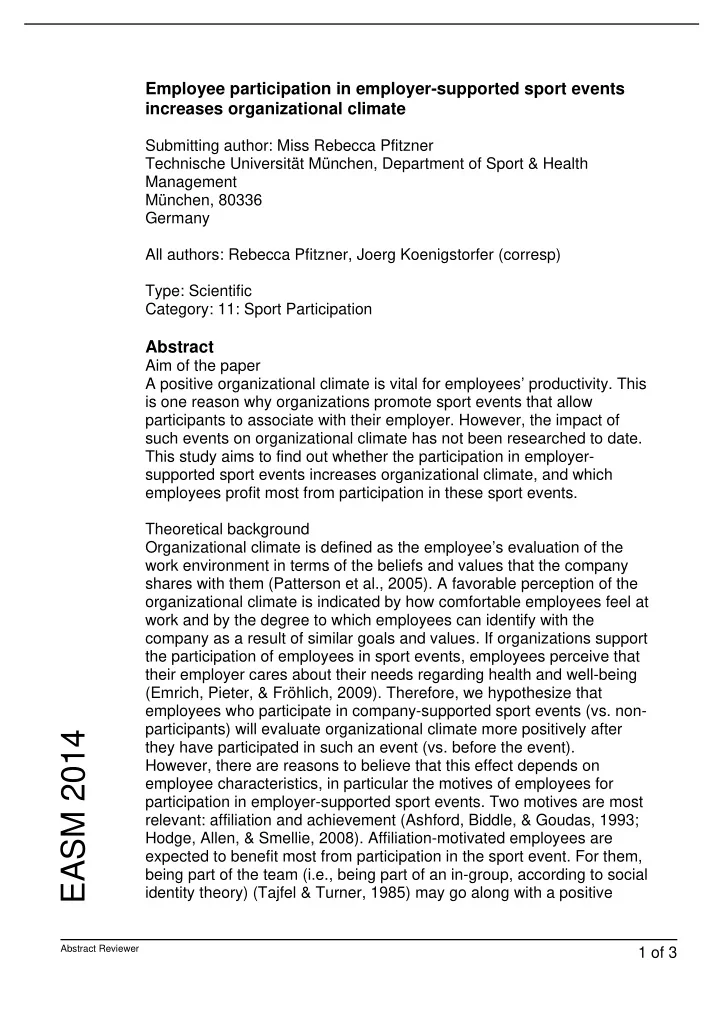

Employee participation in employer-supported sport events increases organizational climate Submitting author: Miss Rebecca Pfitzner Technische Universität München, Department of Sport & Health Management München, 80336 Germany All authors: Rebecca Pfitzner, Joerg Koenigstorfer (corresp) Type: Scientific Category: 11: Sport Participation Abstract Aim of the paper � A positive organizational climate is vital for employees’ productivity. This is one reason why organizations promote sport events that allow participants to associate with their employer. However, the impact of such events on organizational climate has not been researched to date. This study aims to find out whether the participation in employer- supported sport events increases organizational climate, and which employees profit most from participation in these sport events.� � Theoretical background� Organizational climate is defined as the employee’s evaluation of the work environment in terms of the beliefs and values that the company shares with them (Patterson et al., 2005). A favorable perception of the organizational climate is indicated by how comfortable employees feel at work and by the degree to which employees can identify with the company as a result of similar goals and values. If organizations support the participation of employees in sport events, employees perceive that their employer cares about their needs regarding health and well-being (Emrich, Pieter, & Fröhlich, 2009). Therefore, we hypothesize that employees who participate in company-supported sport events (vs. non- participants) will evaluate organizational climate more positively after EASM 2014 they have participated in such an event (vs. before the event).� However, there are reasons to believe that this effect depends on employee characteristics, in particular the motives of employees for participation in employer-supported sport events. Two motives are most relevant: affiliation and achievement (Ashford, Biddle, & Goudas, 1993; Hodge, Allen, & Smellie, 2008). Affiliation-motivated employees are expected to benefit most from participation in the sport event. For them, being part of the team (i.e., being part of an in-group, according to social identity theory) (Tajfel & Turner, 1985) may go along with a positive Abstract Reviewer 1 of 3
change in organizational climate because they are mostly interested in sharing the experience with others and thus sharing the values of the events, which center around fitness and health. Achievement-motivated employees, however, aim to be better than others (Ashford, et al., 1993; Hodge, et al., 2008). For them, we expect a smaller change in organizational climate because they are less interested in sharing the experience with their colleagues.� � Methodology and research design� A corporate running event (6k run in a park in large German city) provided the context for the study. Data were collected two to four weeks before and after the event. Ninety-six university employees participated in the longitudinal study (42 runners and 54 controls). Participants were recruited after they had registered for the event (without knowing the purpose of the study). Controls (i.e., non-participants) were randomly selected from the list of employees. � Organizational climate was used as dependent variable. It was measured using a six-item scale. The moderator variable of in-group motivation (affiliation vs. achievement) was also measured via six items, three items referring to the participation of others in sports (i.e., the evaluation of other athlete’s motives; this allowed us to include the control group in the analysis) and three items referring to own sport participation (i.e., the motive for participation in the corporate running event; assessed only in the experimental group). All items were anchored at 1 (‘I do not agree at all’) and 5 (‘I fully agree’). � � Results, discussion, and implications� A mixed ANOVA revealed a significant interaction between time (before vs. after the event) and participation as a runner (yes vs. no) (F(1,94) = 7.49, p = .007). The interaction effect results from different patterns of change in organizational climate from the first to the second wave between the two groups. Employees who participated in the event perceived organizational climate more positively in the second wave than in the first wave. There was no change in employees who did not participate in the running event. These results support our assumptions.� Regression analyses using participants in the event only further showed that the effect was present in employees with mid to high-level affiliation motive (and low achievement motive), but absent in employees with low EASM 2014 affiliation (and high achievement) motive. This supports our predictions. 71% of the employees belonged to the first group of participants and 29% of the employees belonged to the latter group of participants.� The findings indicate that employers may not only benefit from sport events in terms of increasing the health status of their employees, but also in terms of perceived organizational climate, which is a predictor of team performance, employee satisfaction, and organizational commitment (Luthans et al., 2008). We, therefore, recommend that employers promote sport events and seek to make athletes feel that they belong to a group of active persons in the organization, sharing the Abstract Reviewer 2 of 3
experience with colleagues. References Ashford, B., Biddle, S., & Goudas, M. (1993). Participation in community sports centres: Motives and predictors of enjoyment. Journal of Sports Sciences, 11(3), 249-256.� Emrich, E., Pieter, A., & Fröhlich, M. (2009). Company workplace health promotion - effects on working atmosphere, identification with the company and subjective well-being [Eine explorative Studie zur betrieblichen Gesundheitsförderung–Auswirkungen von Betriebssport auf das Betriebsklima, die Unternehmensidentifikation und das subjektive Wohlbefinden der Teilnehmer]. Zeitschrift für Sozialmanagement, 7(1), 65- 82.� Hodge, K., Allen, J. B., & Smellie, L. (2008). Motivation in Masters sport: Achievement and social goals. Psychology of Sport and Exercise, 9(2), 157-176.� Patterson, M. G., West, M. A., Shackleton, V. J., Dawson, J. F., Lawthom, R., Maitlis, S., et al. (2005). Validating the organizational climate measure: links to managerial practices, productivity and innovation. Journal of Organizational Behavior, 26(4), 379-408.� Tajfel, H., & Turner, J. C. (1985). The social identity theory of intergroup behavior. In S. Worchel & W. G. Austin (Eds.), Psychology of Intergroup Relations (Vol. 2, pp. 7-24). Chicago: Nelson-Hall. EASM 2014 Abstract Reviewer 3 of 3
Recommend
More recommend